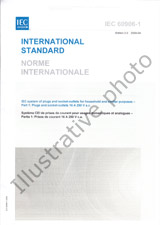We need your consent to use the individual data so that you can see information about your interests, among other things. Click "OK" to give your consent.

IEC 60068-2-2-ed.5.0
Environmental testing - Part 2-2: Tests - Test B: Dry heat
STANDARD published on 16.7.2007
The information about the standard:
Designation standards: IEC 60068-2-2-ed.5.0
Publication date standards: 16.7.2007
SKU: NS-408632
The number of pages: 29
Approximate weight : 87 g (0.19 lbs)
Country: International technical standard
Category: Technical standards IEC
The category - similar standards:
Annotation of standard text IEC 60068-2-2-ed.5.0 :
IEC 60068-2-2:2007 Deals with dry heat tests applicable both to heat-dissipating and non heat-dissipating specimens. For non heat-dissipating specimens, Tests Bb and Bd do not deviate essentially from earlier issues. The object of the dry heat test is limited to the determination of the ability of components, equipment or other articles to be used, transported or stored at high temperature. These dry heat tests do not enable the ability of specimens to withstand or operate during the temperature variations to be assessed. In this case, it would be necessary to use IEC 60068-2-14 Test N: Change of temperature. The dry heat tests are subdivided as follows: - Dry heat test for non heat-dissipating specimens with gradual change of temperature, Bb. - Dry heat tests for heat-dissipating specimens with gradual change of temperature, Bd; with gradual change of temperature, specimen powered throughout, Be. The procedures given in this standard are normally intended for specimens that achieve temperature stability during the performance of the test procedure. The main changes from the previous edition are as follows: Tests Ba and Bc have been deleted since they were more severe tests than Test Nb, IEC 60068-2-14: Change of temperature. Secondly it was considered justified to delete the 3 % value on the temperature difference between the chamber air and the wall temperatures. Thirdly it is proposed that the test specimen be powered throughout the test where required; and, finally, the annexes have been removed. IEC 60068-2-2:2007 Traite des essais de chaleur seche applicables a la fois aux specimens dissipant de lenergie et a ceux ne dissipant pas denergie. Les essais Bb et Bd destines a des specimens ne dissipant pas denergie ne presentent pas de modifications importantes par rapport aux editions precedentes. Le but de lessai de chaleur seche se limite a la determination de laptitude des composants, equipements ou autres articles a etre utilises, transportes ou stockes a haute temperature. Ces essais de chaleur seche ne permettent pas de verifier laptitude des specimens a subir ou a fonctionner pendant les variations de temperature. Dans ce cas, il serait necessaire dutiliser lessai N de la CEI 60068-2-14: Variations de temperature. Les essais de chaleur seche se subdivisent de la facon suivante: - Essai de chaleur seche pour specimens ne dissipant pas denergie avec variation lente de la temperature, Bb. - Essais de chaleur seche pour specimens dissipant de lenergie avec variation lente de la temperature, Bd; avec variation lente de la temperature, pour les specimens dissipant partout, Be. La procedure decrite dans cette norme est normalement prevue pour les specimens qui atteignent la stabilite thermique pendant le deroulement de lessai. Les principaux changements par rapport a ledition precedente sont les suivants: Les essais Ba et Bc ont ete retires puisquils etaient plus severes que lessai Nb de la CEI 60068-2-14: Variations de temperature. Deuxiemement, il a ete considere justifie de supprimer la valeur de 3 % sur la difference de temperature entre lair de la chambre dessai et les temperatures des parois. Troisiemement, il est propose et non plus exige que le specimen dessai soit mis en fonctionnement durant lessai; et, pour finir, les annexes ont ete retirees.
We recommend:
Updating of laws
Do you want to be sure about the validity of used regulations?
We offer you a solution so that you could use valid and updated legislative regulations.
Would you like to get more information? Look at this page.



 Cookies
Cookies
